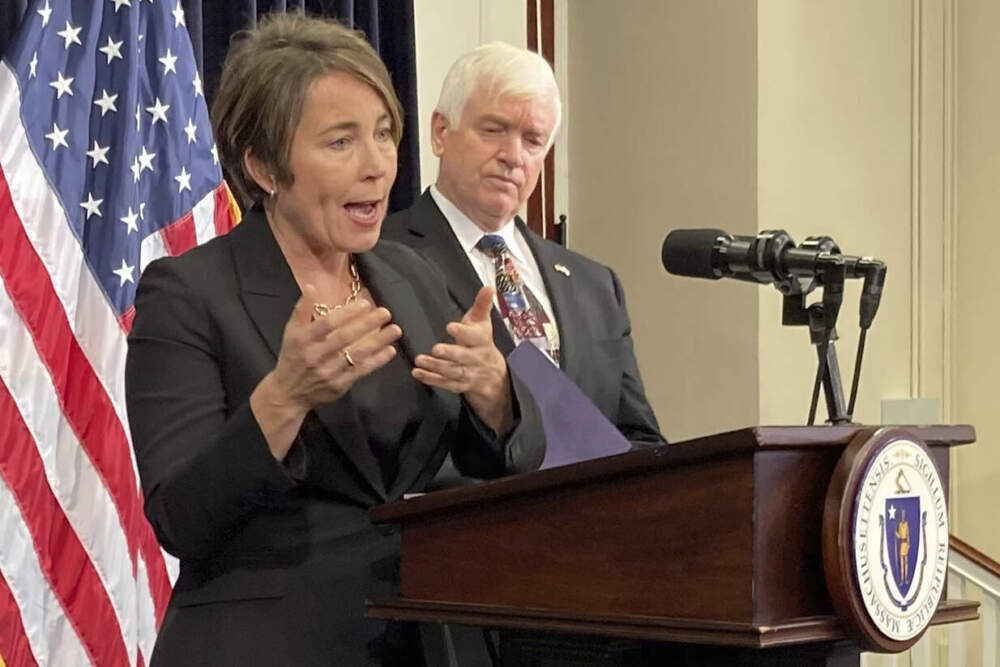Advertisement
Boston's Morning Newsletter
What's ahead for the Mass. family shelter system as it approaches this week's cutoff

Editor's Note: This is an excerpt from WBUR's daily morning newsletter, WBUR Today. If you like what you read and want it in your inbox, sign up here.
While this past Saturday got balmy enough for humans and animals alike to take a dip in the water, you’ll want to have your umbrella and coat back on hand for the weather ahead this week. (The good news is that it should at least be dry for trick-or-treating tomorrow.)
But first, the news:
Massachusetts is slated to stop accepting new arrivals in the state’s family shelter system this Wednesday. However, a new lawsuit by a local legal aid group could pose an obstacle. Here’s the latest on what’s happening with the system as it approaches the deadline:
- What’s the reason for the shelter cap? Gov. Maura Healey says the family shelter system — which guarantees housing for families and pregnant women under a 1983 law — is hitting its capacity, due to a dramatic increase in immigration to the state. Over the last year, the shelter population has more than doubled, from 3,288 households at the end of last October to close to 7,500 now. (State officials say it would hit 13,000 families next June at this rate if they don’t impose a cap.) The Healey administration says they simply don’t have the space or money to safely expand the system.
- What happens on Wednesday? The state will begin using a waitlist for new arrivals, meaning eligible families would only get shelter when another family exits the system. And while the state will try to connect those on the waitlist with other assistance programs, there aren’t any plans to provide temporary shelter.
- What is the lawsuit’s argument? The Boston-based legal aid group Lawyers for Civil Rights argues that the Healey administration can’t make such abrupt changes to the state’s right-to-shelter law. According to the group, the state is required to give lawmakers 90 days notice before making any significant changes to the shelter system. (The cap was announced on Oct. 16.) “The idea that the state would turn its back on children in desperate situations, forcing them to live in the streets, in cars, and in unsafe situations is appalling to many in the state,” LCR’s litigation director, Oren Sellstrom, told WBUR’s Gabrielle Emanuel.
- What are the next steps? LCR’s lawsuit is seeking an emergency court hearing today or tomorrow to stop the waitlist system from taking effect Wednesday. (Healey has argued they’re not changing the system, but just taking steps to handle the growth in families.)
- What else is the state doing? This morning, Healey’s office announced the state will partner with the Biden administration to host a work permit clinic next month for migrants in the family shelter system. Healey says it will help speed up the process of allowing new migrants to legally work — so they can support themselves and open up more space in the shelter system.
This Wednesday is also the deadline for those living in tents near the so-called “Mass. and Cass” area in Boston to leave, before the city begins clearing out the encampments. A new ordinance signed last week by Mayor Michelle Wu gives police more power to remove tents.
- Where will they go? Wu told WCVB this weekend that her administration is working to make sure other makeshift tent encampments don’t pop up elsewhere. The city has reserved 100 shelter beds for people currently living at Mass. and Cass and social workers have been in the area for weeks to help connect people to those services. “People have already said they are excited and eager to go to this particular space,” Wu told WCVB.
Back on track: The Red Line’s Ashmont branch and Mattapan trolley officially resumed service this morning — and riders should notice their trips are significantly faster. MBTA spokesperson Lisa Battiston said in an email that the 16-day closure for track work (and other station improvements) should allow them to lift all speed restrictions between Ashmont and JFK/UMass.
- How much faster will it be? Before the closure, T officials said trips between Ashmont and JFK/UMass took around 16 or 17 minutes. But with no speed restrictions or other issues, it can be as fast as nine minutes. (Battiston says the “goal” is still to have trains running full speed ahead. TBD if that indeed happens.)
Police are searching for 18-year-old Kevin Rodriguez on charges in connection with a late-night shooting this weekend at Worcester State University that killed one person and injured another. State police released photos of Rodriguez, whose last known address is in Lawrence. Anyone who sees him should immediately call 911. Officials said he should be considered armed and dangerous.
P.S.— In-person early voting began this weekend in Boston’s City Council general election. While the main early voting site is City Hall, there are over a dozen other locations spread around the city — and any registered Boston voter can vote at any of them. Click here for information on the sites and hours (or check out this map).
